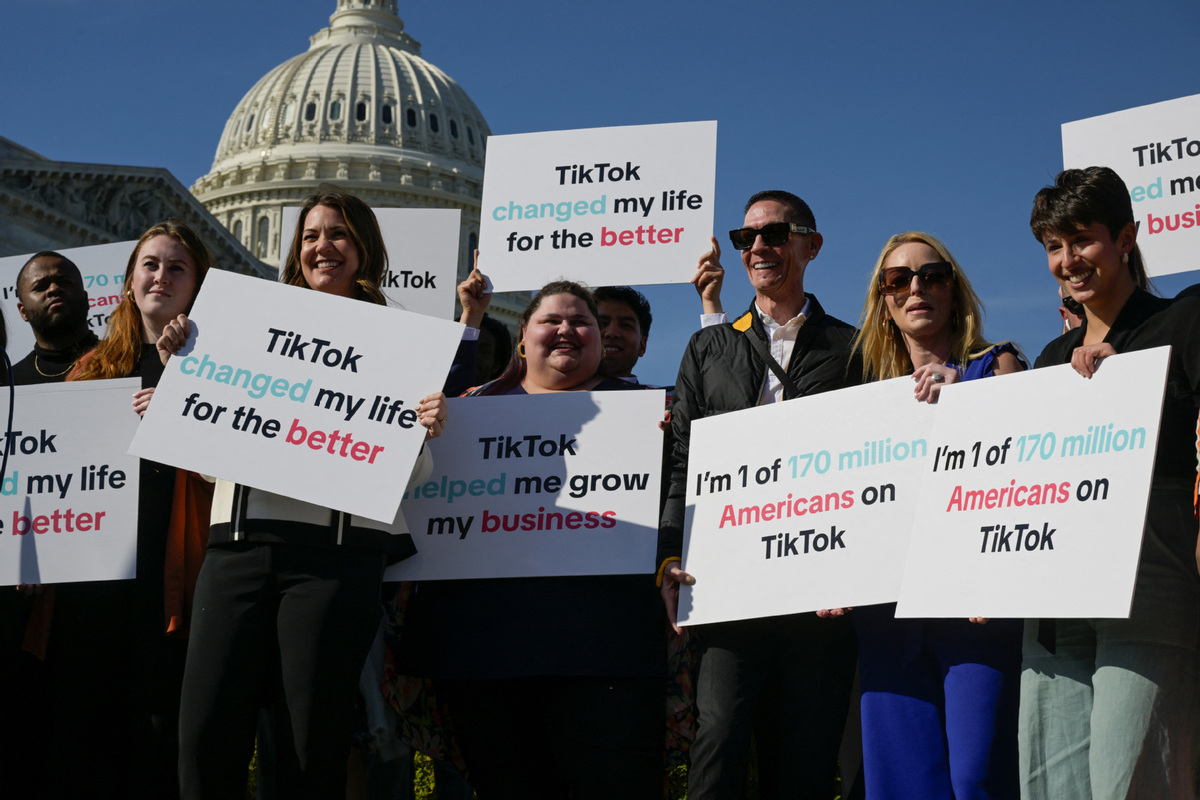TikTok ban may face pushback in Senate, court
Potential violations of First Amendment of US Constitution key concern among lawmakers






In a widely criticized move, the United States House of Representatives approved a bill on Wednesday giving TikTok's parent company ByteDance about six months to divest the US assets of the video app or face a ban. According to several US experts, the bill could stall when it goes to the Senate and could also be challenged in court.
"Although the House passed the bill in a 352-65 vote seeking to ban TikTok in the United States, those favoring the ban still face an uphill battle in the Senate and, probably, in court," Mei Gechlik, founder and CEO of Sinotalks, a think tank and consultancy, told China Daily.
The bill represents the latest efforts by US lawmakers to force a sale of TikTok or ban it from app stores. The legislation has been passed by the House but still must clear the US Senate. US President Joe Biden said he would sign the legislation if it is approved by Congress.
Unlike the House, the Senate includes Republican and Democrat leaders opposed to or doubtful about the bill for various reasons, including concerns over free speech, Gechlik said.
"Such concerns could also lead to challenges in court, as multiple groups, including the American Civil Liberties Union, have suggested potential First Amendment violations," she added.
Sourabh Gupta, a senior fellow at the Washington-based Institute for China-America Studies, told China Daily, "TikTok's situation is unique because it engages the US Constitution's First Amendment rights too.
"This could lead to it stalling in the US Senate, as senators examine the underlying national security argument as well as the precedent of potentially banning a platform of information and exchange of views. And it takes very few in the Senate to stall a piece of legislation."
TikTok said in a statement on Wednesday that its attention will now shift to the Senate. It criticized House lawmakers' fast-tracking of the bill and their decision to hold a closed-door briefing for members that highlighted the app's purported national security risks.
"This process was secret and the bill was jammed through for one reason: it's a ban," a TikTok spokesperson said in a statement. "We are hopeful that the Senate will consider the facts, listen to their constituents and realize the impact on the economy, the 7 million small businesses and the 170 million Americans who use our service."
Speaking about the developments, Democratic Senator Ron Wyden of Oregon, chairman of the Senate Finance Committee, said, "These fields are evolving and changing so rapidly that you can do a lot of damage by moving too quickly or without the facts."
Republican Senator Rand Paul of Kentucky raised more concerns. In an opinion piece published on Wednesday in The Courier-Journal of Louisville, Kentucky, he wrote: "I hope saner minds will reflect on which is more dangerous: videos of teenagers dancing or the precedent of the US government banning speech. For me, it's an easy answer, I will defend the Bill of Rights against all comers, even, if need be, from members of my own party."
He added: "If you don't like TikTok or Facebook or YouTube, don't use them. But don't think any interpretation of the Constitution gives you the right to ban them."
Paul also posted on X: "Reactionaries who want to ban TikTok claim the data can't be secured because the 'algorithm' is in China. Not true. The truth is the algorithm runs in the US in oracle cloud with their review of the code."
TikTok also could challenge the legislation in court, arguing that it violates the First Amendment of the US Constitution. After Montana banned TikTok last year, a federal judge blocked the state's measure, citing free speech concerns.
Critics also accused the US government of lacking real concerns about abuse of users' data by other social media platforms, such as Meta. The Electronic Frontier Foundation said that if the US was really concerned about China and data privacy, it would push legislation that applies to all social media companies, not just TikTok.
Gary Hufbauer, a nonresident senior fellow at the Washington-based Peterson Institute for International Economics, told China Daily: "I'm not a TikTok user, but this is most unfortunate. There is no evidence that TikTok is spying on its users. I hope that the Senate will refuse to pass parallel legislation. The main result of banning TikTok would be to create more business for its US competitors."
Potential buyers are already circling. Former treasury secretary Steven Mnuchin told CNBC on Thursday that he was putting together a consortium to try to buy TikTok.































